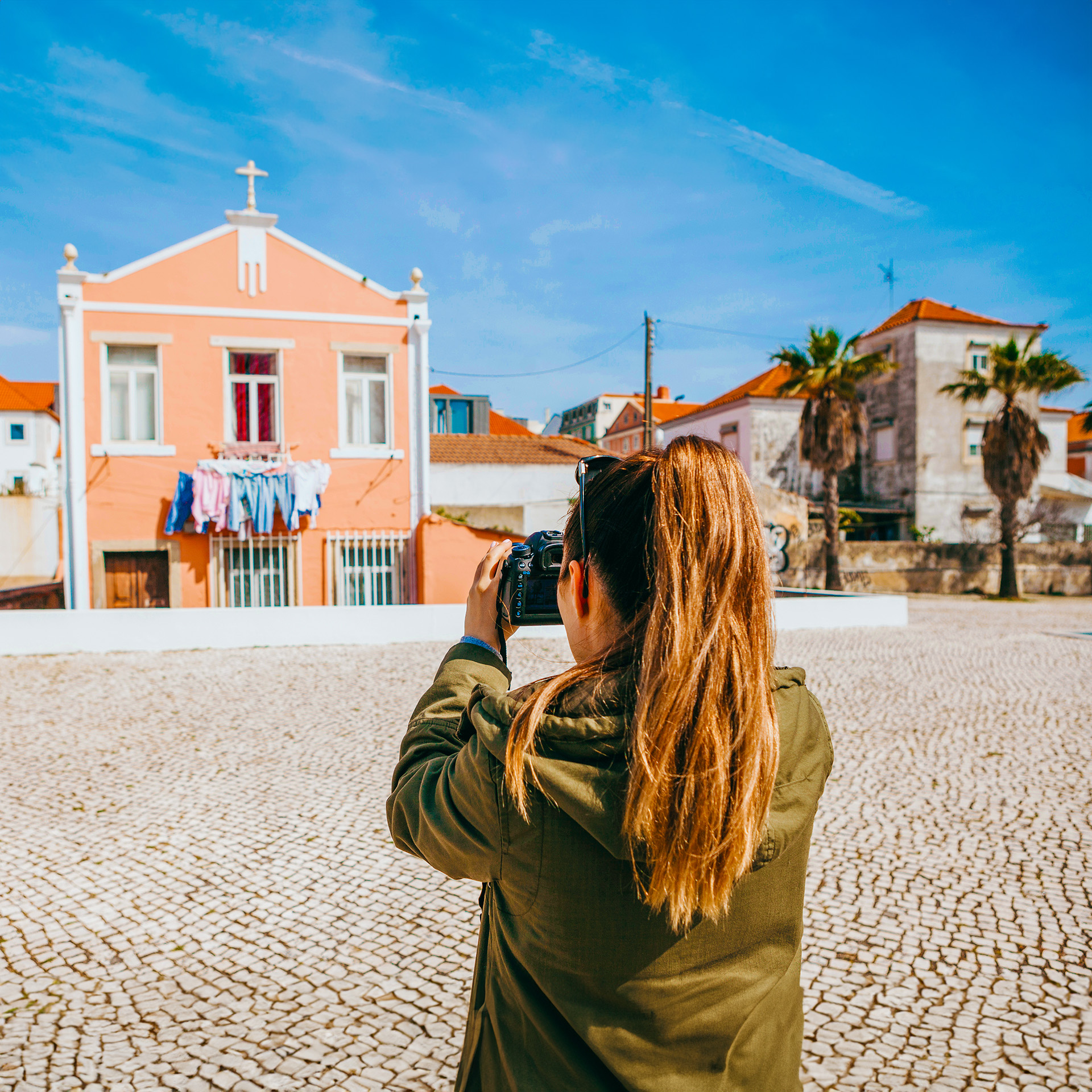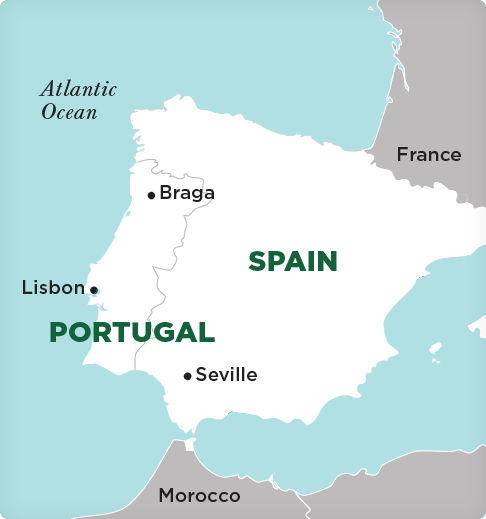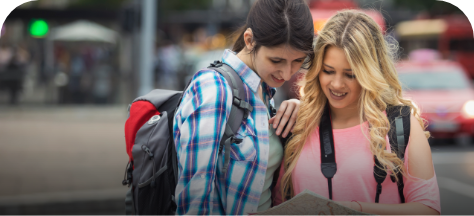Credits
16
Prerequisites
None
Language of Study
Portuguese
Courses taught in
English
Dates
Jan 28 – May 12
Program Countries
Portugal
Program Excursion Countries
Spain
Program Base
Lisbon
Critical Global Issue of Study
Identity & Human Resilience

Become a skilled multimedia storyteller as you create engaging traditional or digital messages in an intercultural context.
16
None
Portuguese
English
Jan 28 – May 12
Portugal
Spain
Lisbon
Identity & Human Resilience
This program provides you with the hands-on experience you need to become a skilled multimedia storyteller. Learn to research, produce, and incorporate text, audio, graphics, and other imagery to create engaging traditional or digital messages in an intercultural context. Expand your multimedia abilities and use them to enhance your intercultural communication skills and prepare for an international career, whether you are majoring in journalism and media studies, social sciences or humanities, math, or technology.
From the program’s base in Lisbon, you will utilize professional-grade television and radio recording and editing equipment. Under the guidance of media and arts professionals, you will collaborate on small media projects with local peers and build a portfolio of dynamic and engaging content. In the Multimedia Storytelling Atelier, you will engage in a series of creative experiments to enhance your sensory perceptions, intercultural communication and production skills, and prepare to complete a final multimedia project.
None


A small city of 200,000 people in the north of Portugal, Braga has recently become a hub of media, art, and technology and was named a UNESCO Creative City in the field of media arts in 2017. You will visit GNRation, a multidisciplinary visual and performing arts space that supports emerging experimental artists. You’ll also have a chance to visit small galleries around the city, attend musical performances, or take in public art exhibits. Braga also provides a unique case study in how arts organizers and others working in the media landscape have mobilized public and private funds to create a vibrant and supportive community for emerging and established artists through festivals, fellowships, educational initiatives, and curation.
Capital of the autonomous region of Andalusia, Seville is a small city with a rich cultural and artistic history. Andalusia is known as the birthplace of flamenco, which arises from diverse Spanish, Roma, and Latin musical and dance traditions that have passed through Seville over many centuries. You will visit art museums and learn how the city is using digital tools to revive and reimagine its rich cultural heritage. You’ll also visit the Caixa Forum Cultural Center to see how architects and artists have turned this defunct textile factory into a hub for media arts exhibits and performances.
Please note that SIT will make every effort to maintain its programs as described. To respond to emergent situations, however, SIT may have to change or cancel programs.
Upon successful completion of the program, students will be able to:
Read more about Program Learning Outcomes.
The following syllabi are representative of this program. Because courses develop and change over time to take advantage of dynamic learning opportunities, actual course content will vary from term to term.
The syllabi can be useful for students, faculty, and study abroad offices in assessing credit transfer. Read more about credit transfer.
Multimedia Storytelling and Intercultural Communication – syllabus
(COMM3010/ 3 credits)
The lines between art and commerce, between producer and consumer, between content creator and audience are increasingly blurred in today’s media landscape. In the private sector, corporations rely on user-generated content campaigns and consumer communities to create new products and market them in increasingly powerful ways. In this course, students learn fundamental theories of intercultural communication and consider how to apply these in a range of multimedia storytelling projects. Media artists, journalists, designers, and content creators are increasingly called to work across mediums, platforms, and cultures to share stories and build campaigns. This course gives students the relevant background to consider how messages and discourses can be amplified and refracted across cultures. Students develop the critical tools to evaluate media campaigns, to understand their own biases and cultural upbringings, and to consider how to create content that aligns with their ethics, values, and interests in variety of professional settings.
Multimedia Storytelling Atelier – syllabus
(COMM3015 / 3 credits)
This course gives students the space and time to develop the technical, editorial, and artistic skills to create compelling, creative multimedia content and artistic pieces on a range of critical global issues. Utilizing a slow learning approach to creative production, much of the class time in this course will be devoted to workshopping and pursuing student-generated ideas under the guidance of the course instructor and professional experts working in the fields of video/film production, radio/sound art production, graphic design, the visual arts, and the performing arts (depending on student interest). Students work independently, in small groups with SIT classmates, and collaboratively with local peers on a range of projects, with a focus on process over product. This course is designed to provide students with the production skills and confidence to successfully complete a creative or research-focused Independent Study Project in the final month of the semester.
Research Methods and Ethics – syllabus
(ANTH3500 / 3 credits)
This seminar explores qualitative and arts-based research methodologies as well as the ethical considerations that guide researchers, journalists, and multimedia content creators. The course touches on the growing field of research creation, which arises from the intersection of art, theory, and academic inquiry. Students gain the knowledge and skills essential to forming constructive and ethical relationships with creative collaborators, co-researchers, and organizations so that they can successfully complete an Independent Study Project in Portugal. Through reading and discussion, students interrogate their own values, ways of creating knowledge, and biases to consider the variety of ways in which artistic and research ideas are represented, related to, and reproduced in various contexts.
Portuguese Introductory I – syllabus
(PORT1003 / 3 credits)
This Portuguese Introductory I language course is designed to meet the needs of SIT students with minimal or no Portuguese language proficiency. The course focuses on oral expression, comprehension, structure, and grammar, and integrates the four language skills (listening, speaking, reading, and writing) through a student-centered learning approach. Students engage in class activities and are encouraged to speak Portuguese to their language competence. The student’s learning is enhanced and reinforced through the utilization of audio and visual aids, regular field visits, and weekly tutorials. Course content focuses on grammatical structure, greetings, verb conjugation and tenses, regular and irregular verbs, prepositions, possessives, definite and indefinite articles, demonstrative pronouns, object pronouns, adverbs, indefinite pronouns, and negative, affirmative, and interrogative forms.
Portuguese Introductory II – syllabus
(PORT1503 / 3 credits)
The Portuguese Introductory II course is focused on developing the student’s communication skills in Portuguese. Special emphasis is dedicated to the understanding of spoken Portuguese both in formal and colloquial contexts, as participants will engage with a broad variety of native speakers including public officials. The course includes a variety of teaching strategies and approaches, such as lecturing, peer practice, in-class and outside-of-class interviews, field trips with preestablished assignments, songs, games, and videos of cultural and/or linguistic relevance. An effort is made to provide students with realistic situations where the language spoken is a tool, rather than an object in itself, encouraging its authentic and creative use. The field-based classes are carefully planned to provide students with the opportunity to interact with native speakers in a less controlled environment.
Portuguese Intermediate I – syllabus
(PORT2003 / 3 credits)
Portuguese Intermediate II – syllabus
(PORT2503 / 3 credits)
The Portuguese Intermediate I and II courses are designed to expand and reinforce student knowledge of more complex linguistic structures at progressive levels of difficulty. Student learning is enhanced and reinforced through the utilization of media such as newspapers, academic articles, and magazines. The course incorporates field experience and students are encouraged to research and report on topics related to the program theme. By the end of the course, students demonstrate ability to interact with native speakers who are professionals in their field of study, e.g., sustainability, development, or communications.
Portuguese Advanced I – syllabus
(PORT3003 / 3 credits)
Portuguese Advanced II – syllabus
(PORT3503 / 3 credits)
The Portuguese Advanced I and II courses are designed to expand and reinforce student knowledge of more complex linguistic structures at progressive levels of difficulty. Student learning is enhanced and reinforced through the utilization of media such as newspapers, academic articles, and magazines. The course incorporates field experience and students are encouraged to research and report on topics related to the program theme. By the end of the course, students demonstrate ability to interact with native speakers who are professionals in their field of study, e.g., sustainability, development, or communications.
Independent Study Project – syllabus
(ISPR3000 / 4 credits)
The Independent Study Project (ISP) is a self-designed research project offering students the opportunity to undertake a personally significant multimedia project in an intercultural environment. Students can also choose to conduct an independent research project that highlights the regional and cultural reality in a Portuguese intercultural environment. The ISP is the academic component in which the student most directly applies their multimedia skills, tools, and techniques of experience-based learning articulated through the Research Methods and Ethics course, Multimedia Storytelling Atelier, and thematic seminar, while further integrating their language skills and the contacts they have developed in the local community. Each student will plan, develop, and independently undertake a multimedia creative or research-focused project with the advice and guidance of the academic director and an ISP advisor. The final project should provide material evidence of student capability in utilizing appropriate methodologies and in synthesizing experiences in the host culture. Students are expected to submit a substantial multimedia project or written paper and deliver an accompanying oral presentation. It is not uncommon for ISPs to strongly contribute to the student’s choice of subject for graduate studies or professional career.



SIT Study Abroad is committed to ensuring that international education is within reach for all students. We believe in the transformative power of immersive, intercultural experiences and are dedicated to supporting students in their educational journey.
See Full Breakdown
A critical step in preparing for your study abroad program is planning how you will maintain your health and wellbeing. Please review the following information carefully and contact [email protected] with any questions or concerns.
View Information